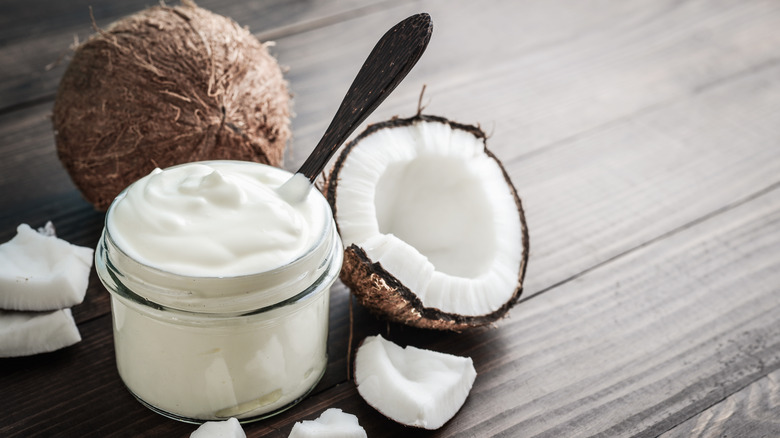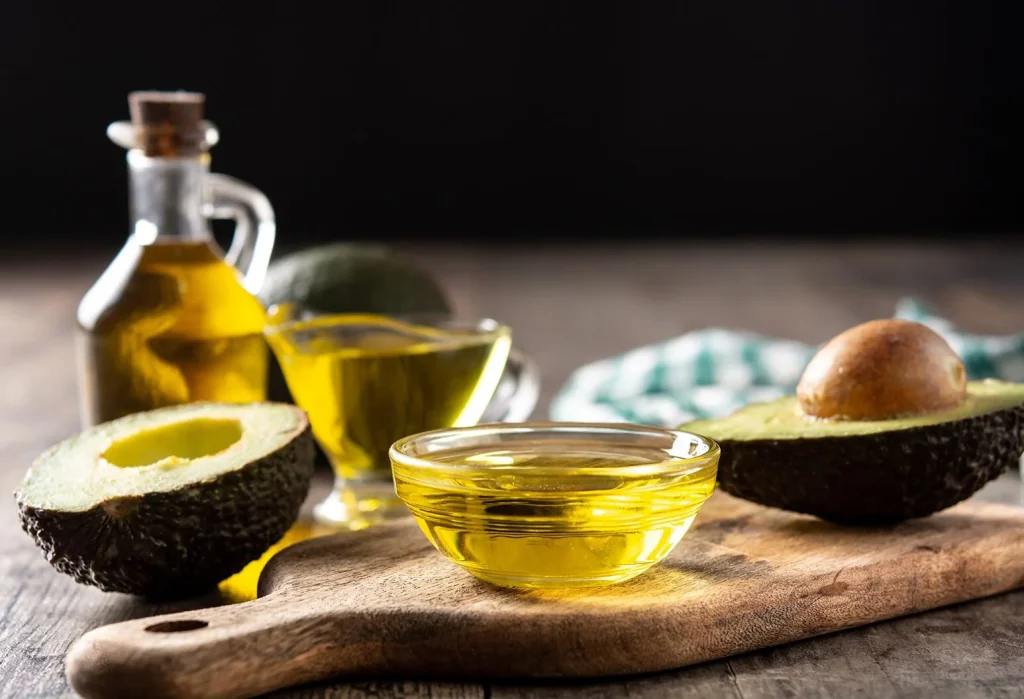
substitute for coconut oil
Table of Contents
5 Best Substitutes for Coconut Oil You Should Try
Introduction
Substitute for coconut oil has long been celebrated for its versatility in cooking, baking, skincare, and even haircare. Its creamy texture, high smoke point, and distinct flavor make it a staple in many households. But what if you run out of coconut oil, have an allergy, or just don’t like the taste? Fortunately, there are several excellent alternatives that can step in when coconut oil is off the table.
In this article, we’ll explore the substitutes for substitute—from full replacements to a halfway option that still mimics its properties but with a twist.
1. Butter – Rich, Creamy, and Readily Available
Butter is perhaps the most accessible and common substitute for coconut oil, especially in baking and cooking. Made by churning cream, butter brings a rich, indulgent taste that’s hard to beat.
Why It Works:
- Flavor: Butter offers a creamy, savory flavor that works especially well in baked goods, sautéed vegetables, and even frying.
- Texture: Like coconut oil, butter is solid at room temperature, making it a great 1:1 substitute in recipes that require structure—such as pie crusts or cookies.
- Smoke Point: With a smoke point of around 350°F (177°C), it’s comparable to unrefined substitute for substitute for coconut oil.
When to Use:
- Baking cookies, cakes, and muffins
- Sautéing vegetables
- Making sauces and gravies
Tip:
Use unsalted butter if you’re replacing coconut oil in sweet recipes. If you’re concerned about dairy, go for plant-based vegan butter.
2. Olive Oil – Heart-Healthy and Flavorful
Olive oil is a Mediterranean kitchen hero that brings both flavor and nutrition to the table. It’s rich in monounsaturated fats and antioxidants, making it a healthier choice compared to many saturated fats.
Why It Works:
- Health Benefits: Olive oil is known for its heart-friendly properties.
- Versatility: It’s great for frying, roasting, and even baking when used in the right proportion.
- Availability: Most kitchens already stock olive oil, making it a convenient go-to.
When to Use:
- Roasting vegetables
- Salad dressings and marinades
- Light sautéing
- substitute for coconut oil
Considerations:
- It has a distinct flavor that might not suit all recipes.
- Not ideal for recipes requiring solid fats, such as certain baked goods.
Tip:
Use light or extra-light olive oil if you want a more neutral taste in your cooking or baking.
3. Avocado Oil – Nutrient-Rich and Neutral in Flavor
Avocado oil is a rising star among healthy oils, often praised for its high smoke point and subtle flavor. Extracted from the pulp of avocados, it’s packed with monounsaturated fats and vitamin E.
Why It Works:
- High Smoke Point: Around 520°F (271°C), making it perfect for high-heat cooking like frying and grilling.
- Neutral Taste: Unlike olive oil, avocado oil has a mild flavor that won’t overpower your dish.
- Nutrition: Rich in antioxidants, anti-inflammatory compounds, and heart-healthy fats.
When to Use:
- Frying or searing meat
- Grilling vegetables
- Baking (in recipes that don’t require a solid fat)
Considerations:
- More expensive than other oils
- Liquid at room temperature, so not suitable for recipes needing a solid fat texture
Tip:
Use it in savory dishes where you want the oil to enhance without altering the original flavor.
Ghee – The Middle Ground Between Butter and Oil
This is our “half” substitute—not quite a full alternative in all scenarios, but excellent in many. Ghee is clarified butter, meaning it has had its milk solids removed. The result is a nutty, aromatic fat that performs well at high temperatures.
Why It Works:
- High Smoke Point: Around 485°F (252°C), higher than substitute for coconut oil.
- Lactose-Free: A great choice for those sensitive to dairy.
- Flavor Depth: Its caramel-like taste adds a rich complexity to dishes.
When to Use:
- Indian, Middle Eastern, or Southeast Asian dishes
- Roasting and sautéing
- Coffee (for those who use coconut oil in bulletproof coffee)
Considerations:
- Distinct flavor might not work in every dish
- Not vegan, as it’s still derived from dairy
Tip:
Try ghee in curries, stir-fries, or even drizzled over popcorn for a flavorful twist.
4. Sunflower Oil
Why It’s a Great substitute for coconut oil
Sunflower oil is a light, neutral-tasting oil with a high smoke point, making it great for frying and baking. It’s also high in vitamin E, an antioxidant that supports skin health.
Flavor & Smoke Point
- Flavor: Mild, slightly nutty.
- Smoke Point: 440°F (225°C) for refined sunflower oil.
Best Uses for Sunflower Oil
✅ Deep Frying – Handles high temperatures well.
✅ Baking – Works in muffins, cakes, and bread.
✅ Homemade Mayonnaise – Light texture and neutral taste.
Pros & Cons substitute for coconut oil
✔ Affordable – Cheaper than avocado and coconut oil.
✔ High Smoke Point – Good for frying.
✖ Low in Nutrients – Less beneficial than olive or avocado oil.
How to Substitute in Recipes
- 1:1 ratio in frying and baking.
5. Shea Butter (For Skincare Only)

Why It’s a Great substitute for coconut oil
If you use coconut oil for moisturizing, hair masks, or lip balms, shea butter is an excellent alternative. It’s thicker, more hydrating, and packed with vitamins A and E.
Best Uses for Shea Butter
✅ Body Moisturizer – Deeply hydrates dry skin.
✅ Hair Masks – Repairs damaged hair and reduces frizz.
✅ DIY Beauty Products – Used in lotions, soaps, and balms.
Pros & Cons
✔ Ultra-Moisturizing – Better for very dry skin than coconut oil.
✔ Anti-Aging Benefits – Reduces wrinkles and improves elasticity.
✖ Not Edible – Only for topical use.
How to Substitute in Skincare
Use as a direct swap in lotions, creams, and hair treatments.
Choosing the Right Substitute
Each coconut oil alternative has its strengths, so the best choice depends on your specific needs. Here’s a quick comparison table:
| Butter | Baking, sautéing | Solid | Creamy, savory | 350°F |
| Olive Oil | Dressings, light cooking | Liquid | Fruity, herbal | 375-405°F |
| Avocado Oil | High-heat cooking, baking | Liquid | Neutral | 520°F |
| Ghee | High-heat, rich flavor dishes | Solid | Nutty, aromatic | 485°F |
When replacing coconut oil in recipes, keep in mind whether you need a solid or liquid fat, what kind of flavor you’re going for, and the temperature you’ll be cooking at.
Bonus Tip:
For skincare and beauty uses, shea butter or jojoba oil are excellent non-comedogenic coconut oil substitutes that won’t clog pores or cause breakouts.
Final Thoughts
While coconut oil is a fantastic all-purpose oil, these five substitutes provide excellent alternatives depending on your needs:
- Olive Oil – Best for dressings, light cooking, and heart health.
- Avocado Oil – Ideal for high-heat cooking and neutral flavor.
- Butter/Ghee – Perfect for baking and rich, savory dishes.
- Sunflower Oil – Great for frying and budget-friendly cooking.
- Shea Butter – Top choice for deep skin and hair hydration.
Each alternative has unique benefits, so experiment to find your favorite!
Would you like additional details on recipes, storage tips, or scientific studies supporting these substitutes? Let me know!
FAQs:
1. How to Choose the Best Coconut Oil Substitutes
How to Choose the Best Coconut Oil Substitutes
Pick based on:
1️⃣ Use – Cooking? Baking? Skincare?
2️⃣ Flavor – Neutral (avocado oil) or rich (ghee)?
3️⃣ Heat – High smoke point for frying (avocado oil), low for dressings (olive oil).
4️⃣ Diet – Vegan? Keto? Allergi Nutrition – Heart-healthy fats (olive oil) or skin benefits (shea butter)?
What Are the Best Substitutes for Coconut Oil?
Olive Oil – Heart-healthy, great for dressings & sautéing (use light olive oil for baking).
2️⃣ Avocado Oil – Neutral taste, high smoke point (perfect for frying).
3️⃣ Butter/Ghee – Rich flavor, ideal for baking & keto diets.
4️⃣ Sunflower Oil – Affordable, neutral, good for frying.
5️⃣ Shea Butter – Best for skincare (deep hydration).
Choose based on cooking needs, flavor preference, and dietary restrictions!











